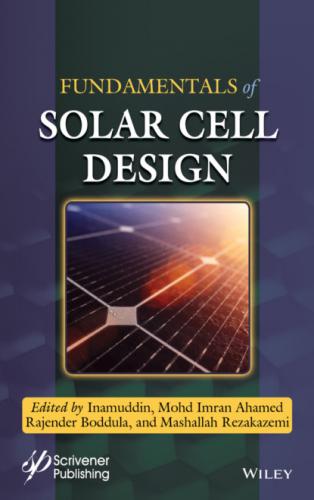5 Preface
7 Index
List of Illustrations
1 Chapter 1Figure 1.1 Classification of solar cells.Figure 1.2 Typical solar cell.Figure 1.3 Possible events present in BHJOSCs.Figure 1.4 Vinylidine dicyano–difluoroindanone compounds.Figure 1.5 Fused benzo-thiadiazole–dicyanoindenone compounds.Figure 1.6 Fused seven rings with dicyanoindenone end groups.Figure 1.7 Fused ring linked with thiophene-dicyanoindenone.Figure 1.8 Fused ring coupled with fluorodicyanoindenone.Figure 1.9 Fused seven membered ring - thienodicyanoindenones.Figure 1.10 Fused six membered ring with dicyanoindenones.Figure 1.11 Fused five membered ring with dicyanoindenone.Figure 1.12 Bifluerene-dicyanoindenone.Figure 1.13 Dialkoxybenzene core–based molecule.Figure 1.14 Fused seven membered ring - methoxydicyanoindenones.Figure 1.15 Fused seven membered ring - dicyanoindenones.Figure 1.16 Fused five membered ring - thienothiophene dicyanorhodanine.Figure 1.17 DPP-thiophene-tetracyanobutadiene-carbazole hybrid.Figure 1.18 Fused nine membered ring - fluorodicyanoindenone.Figure 1.19 Fused seven membered ring - dicyanoindenone.Figure 1.20 Fused seven membered ring acceptors with variation in N-alkyl chain ...Figure 1.21 Calamatic shaped non-fullerene small-molecule acceptors.Figure 1.22 Dicyano and tricyano vinylene–based non-fullerene small-molecule acc...Figure 1.23 Dichloro-dicyano-indocinyl based small-molecule acceptors.Figure 1.24 Halo-dicyanoindacenyl derivatives.Figure 1.25 Contiguously fused five rings having attached BTD and rhodanine or d...Figure 1.26 Fused seven membered ring with bromovinyldicyanoindenones.Figure 1.27 Trimeric BDT linked rhodanine.Figure 1.28 Dicycanoindacenyl and rhodanine end group small-molecule donor and a...Figure 1.29 Benzodithiophene based (BTR and BTR-Cl) small-molecule donors.Figure 1.30 Small-molecule donors from benzodithiophene and alkylsilyl-thienyl–b...Figure 1.31 Benzodithiophene based small-molecule donors with electron withdrawi...Figure 1.32 Trithieno BDT with rhodenone.Figure 1.33 BDT linearly linked trithiophene derivatives.Figure 1.34 Linearly linked pentathiophene with vinyldicyanoindenones.Figure 1.35 BDTT core linked benzotriazole derivatives.Figure 1.36 Thienothiophene with BDTT Core linked with rhodanine.Figure 1.37 Dialkoxybenzene linked BDTT with rhodanine end group.Figure 1.38 Tetrathiophene linked with DPP.Figure 1.39 Fused NDTSR with rhodanine end group.Figure 1.40 Linear BDTT linked trithiophene with rhodanine end group.Figure 1.41 NDIs linked with spacer.
2 Chapter 2Figure 2.1 Schematic representation of photoelectric effect. Einstein equation h...Figure 2.2 Schematic representation of surface plasmon resonance.Figure 2.3 The utilization of plasmonic nanoparticle (upper) and thin film (lowe...Figure 2.4 Approaches to integrate plasmonic nanoparticle in solar cell.Figure 2.5 Bandgap energy vs. λmax curve for various material used in solar cell...Figure 2.6 The device configuration of (a) direct and (b) plasmonic enhanced pla...Figure 2.7 Efficiency for various plasmonic solar cell technology.
3 Chapter 3Figure 3.1 (a) J-V plot A and B. (b) Temperature-current density graph. (Reprint...Figure 3.2 (a) Non-biased EQE spectra and (b) LBIC images using two different la...Figure 3.3 (a) LBIC with and without voltage and light biasing. The 405-nm LBIC ...Figure 3.4 Fabricated 3-TGaAsP on SiGe/Si device. (Reprinted with the permission...Figure 3.5 Schematic of GaAs nanowire-on-Si tandem solar cell. (Reprinted with t...Figure 3.6 (a) Schematic of the GaAsP/Si 2J cell. (b) Energy band diagram. (c) N...Figure 3.7 Crystal structure of (HDA)3CuBr8. (Reprinted with the permission from...Figure 3.8 (a) Absorption of thin
